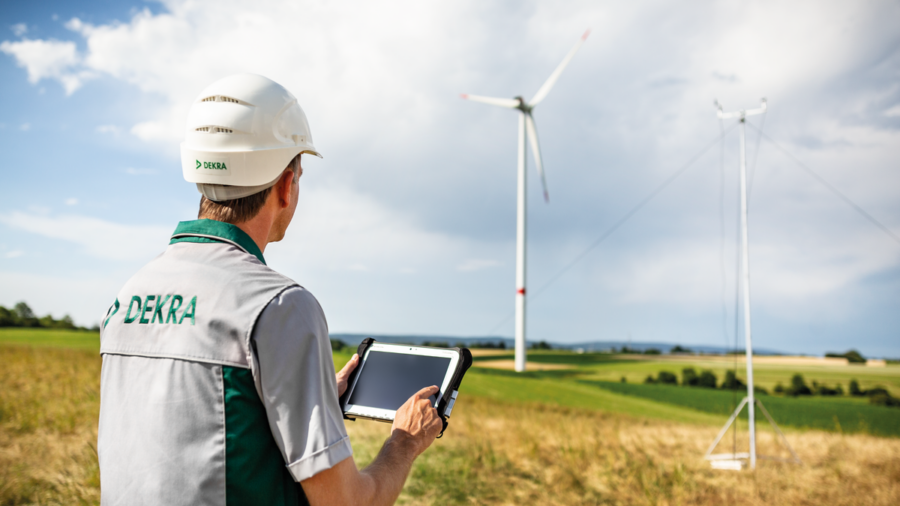
Dubbed the ‘Implementation COP’, Egypt showed that the private sector was ready to do business and turn pledges into action. Vehicle manufacturers came together through the Accelerating to Zero Coalition to push forward with commitments to make all new car sales zero emission by 2035, and more than 550 financial institutions, with assets of over $150tn, are now partnering in the Race to Zero initiative. A growing number of companies are also setting science-based targets around reducing their greenhouse gas emissions.
Among them, Dekra is the world’s largest non-listed expert organisation in the TIC sector which advises businesses from a range of sectors. “Implementing sustainability is not always easy, but businesses can’t afford to ignore it,” explains Stan Zurkiewicz, the company’s chief executive.
No longer relegated to a segregated silo, sustainability is becoming integrated into every business unit as something that can bring economic returns and drive social and environmental impact. The company has a clear and ambitious vision of being the global partner for a safe, secure and sustainable world. On the road, at work and at home, its team is working to increase safety and sustainability across all the key areas of life.
“Delivering greater sustainability can bring strategic advantage too; it’s not just about toeing the regulatory line,” Zurkiewicz continues. “But to do this, collaboration is vital, not just because the issues are too big to tackle alone, but also because by working together, we can help to improve the sustainability of whole sectors.”
Embracing the energy transition
One of the most pressing issues facing businesses today is energy and the transition to greener forms of generation. This push for net zero is leading to new technologies and processes, many of which are being developed at break-neck speed to replace long-established technologies.
The change from combustion engines to batteries and electric vehicles, for instance, or the shift to hydrogen as an energy source, all bring opportunities and advantages but also uncertainties and potential risks which need to be assessed and minimised. Companies adopting these new technologies must be confident that they will perform as promised.
Given the finite resources available to us, and the carbon footprint associated with extracting and processing them, societies must learn to consistently and completely reuse things
Dekra is part of the testing, inspection and certification (TIC) sector, an industry that is playing a critical role in supporting other companies as they develop their sustainability strategies. “Independent, third-party verification is a new must-have for businesses who want to show stakeholders that they understand their responsibilities and the need for transparency,” explains Dekra’s chief financial officer, Wolfgang Linsenmaier.
“Using independent testing and validation companies ensures that only technologies that are fit-for-purpose enter the market, and that builds trust along the supply chain,” he explains. “It also means individual companies don’t have to go to the expense and effort of carrying out their own tests and controls.”
Dekra directly supports the solar supply chain through a new state-of-the-art testing lab in Shanghai. China is the world’s largest supplier of photovoltaic products. It provides certification services along the entire value chain, from raw materials to photovoltaic modules and PV power plant operation, validations that are supporting major initiatives such as REPowerEU, the European Commission’s plan to make Europe independent from Russian fossil fuels.
Dekra also champions the future hydrogen economy, and, through its membership in Hydrogen Europe, it plays a crucial role in monitoring the provenance of green hydrogen. Rather than black or brown hydrogen, which is derived from fossil fuels, green hydrogen is produced using clean energy with water as the only by-product.
Hydrogen’s huge potential to impact long-distance transport is behind a partnership with vehicle leasing start-up Hylane. The brand is set to launch Germany’s first rental fleet of hydrogen-powered trucks, while BMW is just one major manufacturer that uses Dekra’s technology centre in Brandenburg to test its fuel-cell vehicles.
Supporting circularity
As the world’s population surpassed eight billion, circularity and how businesses use – and re-use – resources have become a prime concern. “Given the finite resources available to us, and the carbon footprint associated with extracting and processing them, societies must learn to consistently and completely reuse things,” says Zurkiewicz.
Many businesses are experimenting with circularity and using waste as a resource to develop innovative materials and products. But without independent analysis to ensure their quality, potential game changers risk never leaving the factory.
Using old cooking oil to create biofuels may have never taken off without third-party validators collaborating with energy companies to monitor materials early in the cycle. This helped to guard against quality issues and misuse and protected supply chains from financial and reputational damage.
Independent verification can also make a difference on the factory floor, by evaluating and potentially extending the operating life of machines and systems beyond the forecast of manufacturers. “There is an inherent conflict of interest between manufacturers and operators,” Zurkiewicz continues. “The former typically wants to develop and sell new, enhanced equipment, while the latter wants to save costs and maximise returns on their initial investment.
“From a circular economy point of view, extending the service life of equipment is an important factor in conserving resources and energy.”
Drawing a redline under greenwashing
The environmental, social and governance (ESG) landscape is in a constant state of flux. Governments and regulatory bodies must continuously adjust and tweak standards and accreditation programmes to reflect changing global needs and stakeholder expectations. Many companies turn to independent third parties to verify complex statements about emissions reduction or progress towards regulatory targets.
“Greenwashing has become a weighty and pernicious term, which can damage a company’s reputation and open it up to huge financial risk and uncertainty,” says Linsenmaier. “So when companies make a statement or release a report around ESG issues, it needs to be robust, transparent and, most importantly, trustworthy.”
Businesses need a clear picture of the journey their products take from raw material to end-of-life before they can develop a realistic and effective plan to cut emissions and move towards net zero.
Life cycle assessments can address stakeholder concerns about how a company’s products impact the environment. They can provide essential data that demonstrates transparency in the development, use and recycling of their products too. For instance, the electrical and electronics sector is already subject to EU regulations that require manufacturers to take responsibility for their products’ environmental footprint.
Partnerships for the future
Many businesses that came forward at COP27 did so as partners, and Zurkiewicz believes that this sense of collaboration is so vital for the future.
“We need to see leading companies looking beyond their direct business operations and partnering with their industry peers in new ways,” he says. “They need to explore cross-sector and pre-competitive partnerships and start to learn from each other to address the most pressing of the planet’s needs. We, as Dekra, want to be such a partner.”
To learn more, visit dekra.com/en/sustainability/

Dubbed the ‘Implementation COP’, Egypt showed that the private sector was ready to do business and turn pledges into action. Vehicle manufacturers came together through the Accelerating to Zero Coalition to push forward with commitments to make all new car sales zero emission by 2035, and more than 550 financial institutions, with assets of over $150tn, are now partnering in the Race to Zero initiative. A growing number of companies are also setting science-based targets around reducing their greenhouse gas emissions.
Among them, Dekra is the world's largest non-listed expert organisation in the TIC sector which advises businesses from a range of sectors. “Implementing sustainability is not always easy, but businesses can’t afford to ignore it,” explains Stan Zurkiewicz, the company’s chief executive.
No longer relegated to a segregated silo, sustainability is becoming integrated into every business unit as something that can bring economic returns and drive social and environmental impact. The company has a clear and ambitious vision of being the global partner for a safe, secure and sustainable world. On the road, at work and at home, its team is working to increase safety and sustainability across all the key areas of life.

